L I S HANGYIN (813858) had an unremarkable career as a low-level official in various capacities, which included county sheriff, classics professor, and collator in the Imperial Library. He turned to Buddhism later in his life and died a widower at the age of forty-five. C HLOE G ARCIA R OBERTS is the author of
The Reveal, a book of poetry, and the translator of Li Shangyins
Derangements of My Contemporaries: Miscellaneous Notes as well as of Cao Wenxuans childrens book
Feather. She studied Chinese at Wesleyan University, the School of Oriental and African Studies in London, and the University of Oregon. She currently lives in Boston, where she is the managing editor at the
Harvard Review. L UCAS K LEIN is an assistant professor at the School of Chinese at the University of Hong Kong.
Among his translations are Notes on the Mosquito: Selected Poems of Xi Chuan (winner of the 2013 Lucien Stryk Prize) and October Dedications, translations of the poetry of Mang Ke. A. C. G RAHAM (19191991) spent his academic career at the School of Oriental and African Studies in London and is credited with introducing into English several little-known works of Chinese classical literature and philosophy. New York Review Books publishes his influential anthology, Poems of the Late Tang, as part of its Classics series. C. C.
Graham 
 NEW YORK REVIEW BOOKS New York THIS IS A NEW YORK REVIEW BOOK PUBLISHED BY THE NEW YORK REVIEW OF BOOKS 435 Hudson Street, New York, NY 10014 www.nyrb.com Copyright 2018 by NYREV, Inc. Translations copyright by their respective translators as follows: 2018 Chloe Garcia Roberts, 2018 Lucas Klein, 1965, 1977 A. C. Graham Introduction copyright 2018 by Chloe Garcia Roberts All rights reserved. Library of Congress Cataloging-in-Publication Data Names: Li, Shangyin, 813858 author. | Graham, A. C. (Angus Charles) translator. | Klein, Lucas translator. | Klein, Lucas translator.
NEW YORK REVIEW BOOKS New York THIS IS A NEW YORK REVIEW BOOK PUBLISHED BY THE NEW YORK REVIEW OF BOOKS 435 Hudson Street, New York, NY 10014 www.nyrb.com Copyright 2018 by NYREV, Inc. Translations copyright by their respective translators as follows: 2018 Chloe Garcia Roberts, 2018 Lucas Klein, 1965, 1977 A. C. Graham Introduction copyright 2018 by Chloe Garcia Roberts All rights reserved. Library of Congress Cataloging-in-Publication Data Names: Li, Shangyin, 813858 author. | Graham, A. C. (Angus Charles) translator. | Klein, Lucas translator. | Klein, Lucas translator.
Title: Li Shangyin / by Li Shangyin ; edited and translated by Chloe Garcia Roberts ; additional translations by A. C. Graham and Lucas Klein ; introduction by Chloe Garcia Roberts. Description: New York : New York Review Books, 2018. | Series: New York Review Books poets | Includes bibliographical references. paper) Classification: LCC PL2672 (ebook) | LCC PL2672 .A2 2018 (print) | DDC 895.11/3dc23 LC record available at https://lccn.loc.gov/2018010660 ISBN 978-1-68137-225-9 v1.0 Cover and book design by Emily Singer For a complete list of titles, visit www.nyrb.com or write to:Catalog Requests, NYRB, 435 Hudson Street, New York, NY 10014
Contents
EDITORS INTRODUCTION
L I S HANGYIN (, c. 813858), one of the most renowned poets in Chinese literary history, is also regarded as the foremost love poet of the classical language. 813858), one of the most renowned poets in Chinese literary history, is also regarded as the foremost love poet of the classical language.
His work is famous for its sensuality, for his ornate use of imagery and symbolism, and for the mysteriousness of his references and allusions. Written in accreting layers of historical recountings, smears of memories, and remnants of an imagistic language for which the code has been lost, Lis poetry is elusive to the core. Even when read in the original Chinese and in the context of his contemporaries, his poetics continue to defy definitive interpretation. In the words of the scholar and writer Liang Qichao (, 18731929): What Li Shangyins poems are about I cannot determine. I cannot even explain the literal meaning line by line. Yet I feel they are beautiful, and when I read them, they give me a new kind of pleasure in my mind.
Li Shangyin achieved a minimal amount of literary and professional success in his lifetime and was recognized as one of the most important poets of the late-Tang era only after his death. As far as his personal history, not much is known. He was born in southeast China into a family of low-level officials. As a young man, after first failing the civil service examination several times, he eventually passed and embarked on a patchwork career as a middling official in a variety of capacities, ranging from county sheriff, classics professor, collator in the Imperial Library, and assessor for the commissioner of salt and iron. If his career was remarkable in any way, it was the rate at which circumstances beyond his control interfered with his professional trajectory, creating a string of abrupt tenures in a number of unrelated positions. As a writer, he gained increasing fame as a skilled practitioner of the parallel prose style of writing, a form used in official documents and communications.
But this skill was largely used to convey the thoughts and ideas of his superiors, making him in many cases a glorified ghostwriter. In his late twenties, Li married the daughter of a professional mentor with whom he had two children, a boy and a girl. His wife, however, died at an early age, a tragedy he alludes to in many of his poems. Later in life the poet turned to Buddhism. He died shortly after losing his last official position, at the age of forty-five. While Li Shangyins poetry began to be collected in various anthologies fairly quickly after his death, the fact that his work has flourished to such a degree instead of languishing in obscurity can largely be attributed to the prominent editor and literary figure Yang Yi (, 9741020).
After coming across a rare edition of Lis poems, Yang Yi spear-headed an empire-spanning search for hitherto uncollected poems, feeling that what he had read did not fully represent the depth and variety of the poets work. His efforts resulted in the expansion of Lis collected poetry from one hundred poems to just over four hundred (the current count is around six hundred) and served to ensure his poetic legacy. Over the centuries, Li Shangyins work has been the source of endless critical interpretation and explication. His poems have been repeatedly dissected to corroborate various interpretations of his personal history and authorial intent: everything from clandestine affairs and abortions, to veiled pleas for patronage, to outspoken political dissent. This unknowable and elusive quality of his work has become recognized as fundamental to his poeticsand is certainly one of the reasons that, despite his literary stature, Li is not widely read or translated in the States. Until now, there has been only one monograph published in English, in 1969, translated by James Liu; other translations of Lis poetry are scattered in various classical Chinese literature anthologies and scholarly texts.
Another reason for this strange lack of translations might be aesthetic. Compared with the spare naturalism of, say, Wang Wei, Li Bai, and other well-known classical poets of the Tang era who have had a significant influence in American letters, Lis lush style is almost baroque, opulently layered with distinct mythological, historical, personal, and symbolist imagery. This lyricism is practically incongruous within the established expectations of classical Chinese poetry for American readers, and many translators have found him a particularly difficult, if not impossible, poet to translate. Believing that the task of the translator is not clarification but reproduction, I have chosen to embrace Lis elusiveness in Chinese and have tried to maintain that quality in my translations by carrying over the ambiguity inherent in the original texts. Most existing English translations of Li address this aspect of his work by accompanying or implanting the poems with explanations of context and history or by bending the poems to highlight one particular reading of the text. Instead, one of my primary aims was to re-create his foregrounding of the expansive, tactile, and shimmering beauty of the image over specificity and clarification of meaning and narrative.

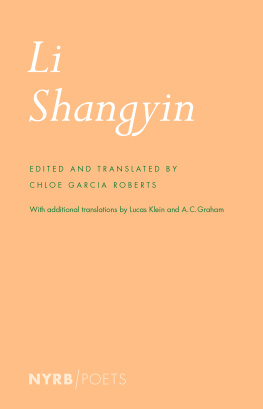
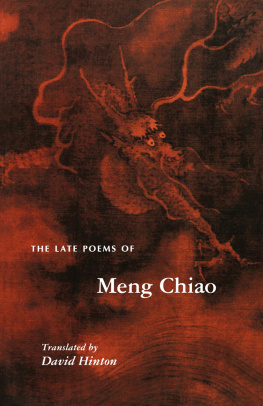

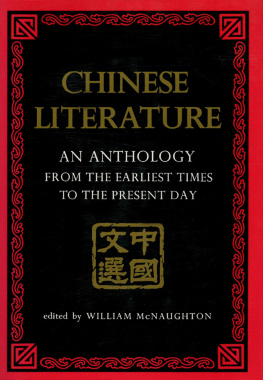

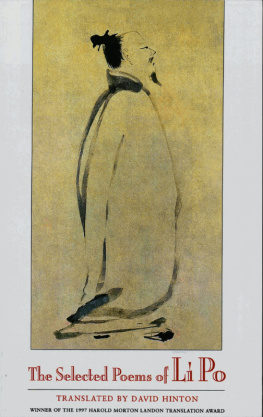
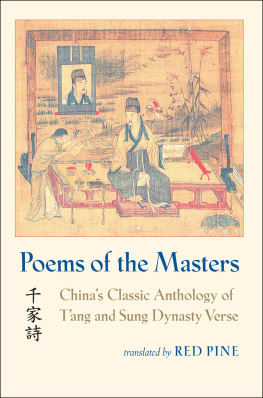


 NEW YORK REVIEW BOOKS New York THIS IS A NEW YORK REVIEW BOOK PUBLISHED BY THE NEW YORK REVIEW OF BOOKS 435 Hudson Street, New York, NY 10014 www.nyrb.com Copyright 2018 by NYREV, Inc. Translations copyright by their respective translators as follows: 2018 Chloe Garcia Roberts, 2018 Lucas Klein, 1965, 1977 A. C. Graham Introduction copyright 2018 by Chloe Garcia Roberts All rights reserved. Library of Congress Cataloging-in-Publication Data Names: Li, Shangyin, 813858 author. | Graham, A. C. (Angus Charles) translator. | Klein, Lucas translator. | Klein, Lucas translator.
NEW YORK REVIEW BOOKS New York THIS IS A NEW YORK REVIEW BOOK PUBLISHED BY THE NEW YORK REVIEW OF BOOKS 435 Hudson Street, New York, NY 10014 www.nyrb.com Copyright 2018 by NYREV, Inc. Translations copyright by their respective translators as follows: 2018 Chloe Garcia Roberts, 2018 Lucas Klein, 1965, 1977 A. C. Graham Introduction copyright 2018 by Chloe Garcia Roberts All rights reserved. Library of Congress Cataloging-in-Publication Data Names: Li, Shangyin, 813858 author. | Graham, A. C. (Angus Charles) translator. | Klein, Lucas translator. | Klein, Lucas translator.